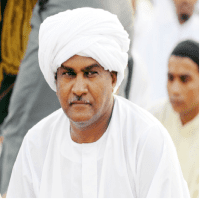The results of the seventh annual Arab Opinion Index (AOI) survey have been released. The AOI deserves the attention of every researcher, given the value its results have in reflecting the state of the nation. This year, 13 Arab countries including Sudan participated. The figures and percentages regarding the popular Sudanese position on the normalisation issue with Israel provided a profound and indicative view that explains the Sudanese people’s stance on this sensitive matter. This requires the decision-makers in Sudan – the civilian government or the military wing that takes the lead in the normalisation process in Sudan – to consider these results and reflect on them.
The results of the poll indicate that the majority of Sudanese people, approximately 77 per cent, said that the Palestinian issue is the issue of all Arabs and not the issue of the Palestinians alone. The majority in urban areas confirmed the same, at 72 per cent, with 79 per cent in the countryside. The Sudanese public opinion amongst 74 per cent of wealthy families, 75 per cent of families living salary to salary and 80 per cent of low-income families agreed with this statement. As for the Sudanese public opinion on the matter of recognising Israel, 88 per cent of women rejected recognition, while 83 per cent of men rejected it.
It is worth noting that the age groups of the percentage of those rejecting recognition of Israel are as follows: 85 per cent of those between the ages of 18 and 24 and those over 55 years old. Meanwhile, 90 per cent of those between the ages 44 and 45 reject recognition. Regarding levels of education: 88 per cent of the illiterate, 85 per cent who did not complete high school, 87 per cent of those who completed high school and 85 per cent of those with higher education degrees reject the recognition of Israel. The percentage of those rejecting recognition in urban areas was lower than those in the countryside, 83 per cent and 87 per cent respectively.
READ: Israel rushes to normalise ties with Sudan
The reasons given by the respondents who agreed with recognising Israel were: it inevitably exists (2.1 per cent), it has already been recognised and peace agreements were signed with it (3 per cent), to achieve comprehensive peace and stability in the region (2.1 per cent), because it is a country like any other and must have a state (0.7 per cent), due to mutual interests (0.8 per cent) and admiration for its progress and development (0.3 per cent). Those who agreed to recognition amount to 13.5 per cent and those who object amount to 79.4 per cent.
![Arab League refuse to condemn UAE-Israel normalisation - Cartoon [Sabaaneh/MiddleEastMonitor]](https://i0.wp.com/www.middleeastmonitor.com/wp-content/uploads/2020/09/Untitled-Artwork-1.jpg?resize=920%2C575&ssl=1)
Arab League refuse to condemn UAE-Israel normalisation – Cartoon [Sabaaneh/MiddleEastMonitor]
A number of facts were revealed, the most prominent of which points to those who adopt the illusion that normalisation prioritises “Sudanese interests”. This is a loose and misleading phrase, as there is no such thing as common Sudanese interests with Israel. Moreover, there are no grounds for such an interest with Israel in the future, as the interests clause is not included in any of the official statements issued by Israel regarding the relationship with Sudan, as it explicitly talks only about declaring a relationship. This confirms that Israel’s view of its relationship with Sudan focuses on one point – disregarding the three Arab nos that were issued by the Arab summit in Khartoum after the 1967 defeat. This was explicitly expressed in an article in Israel’s The Jerusalem Post on 3 October by Neville Teller, entitled “Can we turn Khartoum’s ‘three nos’ into ‘three yeses’?” “The idea of the article embodies the essence of what Israel is working to achieve with Khartoum, which is nothing more than humiliation and compliance.
READ: Sudan’s Hemedti and normalisation
It is interesting that those interested in Sudan’s file of normalisation are mainly the military group in and outside the Sovereignty Council, as well as a few forces associated with the old regime that have no political weight. What unites the military members is their attachment to regional powers and their involvement in the wars in Yemen and Darfur, and above all, their lack of political reading, weakness and reckless drive.
I will end with a past incident. I was once accompanied by Sudanese Ambassador and poet Muhammad Al-Makki Ibrahim, while we were heading to the Sudanese Foreign Ministry headquarters in Khartoum. The entire way there, we were discussing President Jaafar Nimeiry’s involvement in supporting President Anwar Sadat’s signing of the Camp David Accords. Al-Makki stopped by an old man, one of the old ministry drivers, and explicitly asked him: “What do you think of the Camp David Accords?” Without hesitation, the man answered: “Treason”. The ambassador turned to me and said: “See? This is popular consciousness.”
This is precisely what was confirmed by the results of this historical poll, and what the Sudanese people will prove by rejecting normalisation in exchange for subservience and obedience.
Translated from Al-Araby Al-Jadeed, October 2020
The views expressed in this article belong to the author and do not necessarily reflect the editorial policy of Middle East Monitor.

![Protest against normalisation deal with Israel in Khartoum, Sudan on 25 September 2020 [Abbas M. Idris/Anadolu Agency]](https://i0.wp.com/www.middleeastmonitor.com/wp-content/uploads/2020/09/Protest-against-normalization-deals-with-Israel-in-Sudan_7.jpg?fit=920%2C613&ssl=1)







